Daniel Feierstein is one of the world’s most recognised experts on genocide. His research into state-led violence during Argentina’s last military dictatorship (1976- 1983) has been regularly cited in court by plaintiffs and prosecutors since the reopening of the trials investigating crimes against humanity, with his findings having influenced sentences handed down by the courts.
The author of the influential book El genocidio como práctica social – Entre el nazismo y la experiencia argentina (“Genocide as a social practice - between Nazism and the Argentine experience,” Fondo de Cultura Económica, 2007), he has just published a new work, Los Dos Demonios – recargados, [“The two demons – reloaded,” Marea publishers]. His latest addresses the so-called ‘two demons’ theory, a position that attempts to equate the guerrilla-led violence of the 1970s with the repressive activities carried out by the State during that dark period.
That theory, Feierstein believes, has returned to public discourse today, but in an entirely different way. While in the 1980s it was used to justify the prosecution of military leaders, he argues that today’s incarnation is intended to validate the prosecution of former members of guerrilla organisations, and to legitimise what he describes as “state repression.”
In his apartment in Villa Urquiza, Feierstein welcomed the Times and, for more than an hour, he discussed human rights organisations, remembrance and the state of human rights today.
Are human rights groups or advocates aware of what you today see as a new version of the ‘two demons’ theory?
It seems to me that there is awareness of a kind of return of the ‘two demons,’ because it is visible and expressed in the media, and there have been public statements [to that end]. However, I believe that there is no awareness of the differences.
By that I mean that this [present-day] version [of the theory] is not the original one and that, in many ways, it is worse in terms of its intentionality. Its promoters and objectives are different too. There is the same argument, which revolves around equalisation – the equalisation of violence – but there is a different context. Somehow it is like a return to the 1990s, when the human rights movement went out to confront the two demons, though it cannot do so now with the same tools.
Could we argue that judicial sentences put a stop to denialistic speeches? After the courts have acknowledged enforced disappearances, baby-snatching or the existence of concentration camps, for example?
In every historical case, denialism is a process of relativisation and minimisation. There is almost no denialism that says nothing happened. It seems to me that this was never the case in Argentina either.
Denialism is, for example: ‘It wasn’t as they say,’ or ‘They didn’t disappear 30,000,’ [or] ‘It was a war.’ In the case of Nazi denialism, they don’t say that nothing happened, they say: ‘There weren’t six million killed’, ‘It was a war,’ ‘They didn’t die in concentration camps.’
It is true that to the extent that there are sucessful legal cases, the exaggeration of these relativisations becomes more difficult: there is a floor that it is difficult to violate.
Who or what is the driving force behind the new ‘two demons’ version?
There are many. Perhaps the most notorious are these new organisations that have emerged, made up of relatives of the perpetrators of genocide or those who present themselves as victims of terrorist violence, which is mistaken, I think. This hardcore could be found in the demonstrations [witnessed] in Plaza San Martín in 2007. Since then, a large part of the mainstream media have joined them, since 2012 or 2013. Several progressive intellectuals or politicians end up riding along on this reloaded version and have given it a lot of legitimacy.
The fact that these proposals come from the mother of a disappeared person, or from a respected historian or from other figures in the politicalacademic field give it respectability. That is why I say that there is a set of three actors: a hardcore formed by organisations, basically of relatives of military officers; personalities who articulate with this discourse and the mainstream media.
And what about the current government?
Paradoxically, it is not in the government where this reloaded version of the two demons is most strongly assumed. The Mauricio Macri government plays a kind of arbitral role: it gives legitimacy to this vision as another legitimate opinion, as opposition to the human rights organisations. It assumes part of the media discourse, saying that there are two legitimate visions, one has been talked about for years, and one has been silenced, so it is time to give space to those silenced voices.
This idea of a silenced voice ends up being very captivating in media terms. But it is a voice that has been present in the mainstream media. There have been officials more aligned with the discourse of the two demons, though it does not seem to be the government’s narrative. It could be the narrative of Darío Lopérfido or Juan José Gómez Centurión, who are more marginal figures who have paid a political cost for those statements.
Some officials have closed ranks with the forces they lead and offered a new narrative about the 1970s. You argue that this new ‘two demons’ version is aimed at legitimising repression?
That’s right. The demonisation of the 1970s is aimed at demonising social protest today. Then we realise that the different actors, who come together in the ‘reloaded’ version of the two demons, do not necessarily all have the same objectives. The hardcore’s aim is to re-define the 1970s — in many cases presenting undeniable pain, which they seek to equate with the genocide. There are other intentions behind their usage by parts of the media or intellectuals.
The political and historical reality of Argentina in 2018 has nothing to do with the 1960s or 1970s. Now they seek to legitimise state repression through the possibility that the State could assume an equalisation in illegality, as it did in the past. But it must be considered that this legal path of repression comes to be exercised against organisations that are basically linked to protest, ones that do not have any of the same practices of the organisations of the 1960s and 1970s.
Where does the Santiago Maldonado case sit in this scenario, in which we have seen an attack on the organisations that brought the case before national and international courts?
Reversing the logic of the benefit of the doubt is extremely serious, both for Argentine history and for the present. One of the conquests of the fight against impunity in Argentina had to do with understanding the importance of the control of the Armed and Security Forces and always raising the benefit of the doubt with respect to the victims in these cases. When one seeks to reverse this by questioning and establishing doubt about the legality of the denunciation, and try to offer the benefit of the doubt in favour of a repressive force, this creates an enormous danger.
We saw similar statements during the Kirchnerite administration uttered by then-security secretary Sergio Berni…
That is why I say that the reloaded version of the two demons didn’t start with Macri. The hardcore began to work much earlier and the mainstream media began to back it earlier, but also because they had managed to influence sectors of the Kirchnerite governments – which are still active now: Berni, [Miguel] Pichetto, [Guillermo] Moreno.
Can we say that the emergence of these organisations, which are the hardcore of the ‘two demons’ theory if you like, is a reaction to the reopening of trials?
In a way, yes. Just as the popular movement has been transforming – and the appearance of HIJOS in 1995 implied a whole change with respect to the vindication of the militants that disappeared during the dictatorship – I believe that the military [officers’] relatives also suffered transformations. Not only with the trials, but all the remembrance efforts, which made the legitimisation of the genocide unpronounceable.
So new actors appeared, younger ones, and what they seek is to justify what they their relatives did, not to legitimise it. They don’t seek a heroical vindication of the perpetrators, but rather [to emphasise that the] two paths that go hand in hand: on the one hand, the defence of the rights of the perpetrators and, on the other hand, the equation with those who carried out “the other violence.”
In the book you say that human rights organisations have been losing their pluralistic positions, mentioning their endorsement of Daniel Scioli in the presidential race. If they called for people to vote for Cristina Fernández de Kirchner this year, for example, would it be the same situation?
The problem is more how it is done. It is one thing not to be part of a party structure and to consider that in a given situation one option may be more harmful to a camp than another – and it seems to me that there is a lot of legitimacy for human rights organisations to carry out this proposal. And another thing is that an organisation, which is a fundamental institution for denouncing state action in the violation of rights, identifies itself as part of a political force which is in office.
In the case of Scioli ... it was legitimate that many human rights advocates, as individuals, believed that they had to prevent Macri winning [the election]. The problem is when this translates into partisan identification, which is detrimental to the denouncing of human rights violations.
In your opinion, what role has the ‘2x1’ ruling issued by the Supreme Court played in the process of memory, truth and justice in Argentina?
I believe that it set a limit, but it also showed that the reloaded version of the two demons theory could not achieve impunity in the short term.
It seems to me that there is a certain social openness to equality, but that there is no social openness to impunity. It seems to me that the claim comes more from the hand of equating them, in terms of the bringing everyone to the courts, than legitimising impunity.












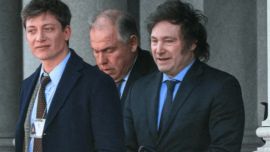




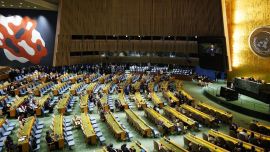
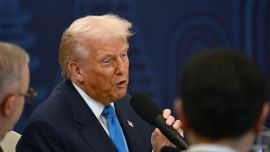

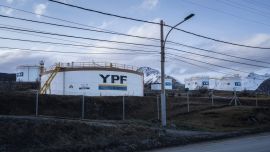
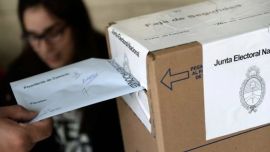
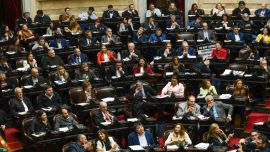
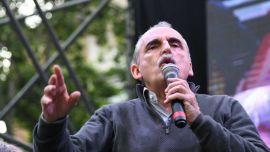

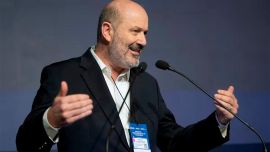
Comments